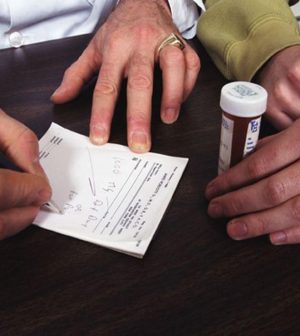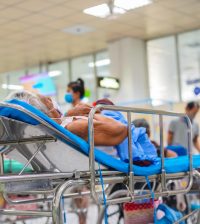- Check Your Fridge for Trader Joe’s Fresh Basil, Linked to Salmonella
- Rising Number of Americans Sent to ERs Last Year During Heat Waves
- Big Health Care Disparities Persist Across the U.S., New Report Finds
- Teens Often Bullied Online About Their Weight: Study
- Work That Challenges Your Brain Helps You Stay Sharp With Age
- Urine Test Might Spot Head-and-Neck Cancers Early
- Many Seniors Are Overmedicated, But ChatGPT Might Prevent That
- Antipsychotics May Do Great Harm to People With Dementia: Report
- Two-Drug Combo Curbs Drinking for People Battling Severe Alcoholism
- Most Homeless Americans Are Battling Mental Illness
Statin Users May Have Added Protection Against Severe COVID-19

Could cholesterol-lowering statins help lower your risk of dying from COVID-19?
For patients with a history of high blood pressure or heart disease, the answer appears to be yes. At least that’s the conclusion of a new study that enlisted roughly 10,500 patients across 104 U.S. hospitals between January and September of 2020.
All had been admitted with a serious bout of COVID-19. Prior to hospitalization, 42% had been taking statins to rein in high cholesterol, with 7% taking statins alone and 35% taking both statins and blood pressure medications.
In the end, about a fifth of the patients either succumbed to COVID-19 or were discharged to a hospice setting.
“[But] we found that patients taking statin medications prior to getting hospitalized due to COVID-19 had a 41% lower risk of dying during that hospitalization, even after adjusting for other factors like age, gender, other medical problems, and what type of medical insurance they had,” said study author Dr. Lori Daniels.
After analyzing data amassed by the American Heart Association, the team also concluded that statin use was similarly linked to a 25% lower risk for developing a “severe outcome” as a result of COVID-19 infection.
Why? Statins might have this effect by “stabilizing the underlying heart conditions for which they are prescribed, making patients more likely to recover from COVID-19,” said Daniels, director of the cardiovascular intensive care unit at the University of California, San Diego.
But not all patients on statins have advanced heart disease, Daniels’ team noted. Many relatively healthy patients also take them in proactively to stave off cardiovascular trouble.
Which begs the question, could statins also lower death among COVID patients who don’t yet have serious underlying heart issues? Daniels suggested the jury is still out on that question.
She noted that statins pack a potentially helpful anti-inflammatory punch. Her team found that statins drove death risk down by 16% among patients with no prior history of heart disease.
Still, Daniels cautioned that for heart healthy patients, the trial results were “not statistically significant.” And “the present study cannot tell us whether giving patients statins, if they are not already on them, would be helpful,” she stressed.
“However, in other settings besides COVID-19, such as patients coming in with large heart attacks, studies have shown that giving statins up front — early in the hospitalization to patients not already on them — improves outcomes,” Daniels said, reducing the risk for future heart attacks and death.
“So, there is precedent for statins making a difference quickly in hospitalized patients,” she noted.
Even so, Dr. Gregg Fonarow — director of the Ahmanson-UCLA Cardiomyopathy Center — had a mixed reaction to the findings.
He acknowledged that there has long been interest in whether heart drugs — including high blood pressure medications and statins– might offer COVID-19 patients a leg up when it comes to lowering disease severity and fatalities.
“And a number of observational studies have suggested there were associations between prior or continued used of these medications and COVID-19 severity and clinical outcomes,” noted Fonarow, who wasn’t part of the study.
But he stressed that nailing down a potential benefit is very difficult, given the wide array of factors that can influence outcomes among COVID patients. And he pointed out that other trials involving heart patients struggling with COVID “have not found benefit or harms” linked to either class of medicines.
Still, Fonarow noted that additional trials are already underway. And “current guidelines recommend continuation of these therapies,” he said.
Daniels and her colleagues published their findings July 15 in the journal PLOS ONE.
More information
The American Heart Association has more on COVID and heart patients.
SOURCES: Lori Daniels, MD, director, cardiovascular intensive care unit, University of California, San Diego; Gregg Fonarow, MD, director, Ahmanson-UCLA Cardiomyopathy Center, Los Angeles; PLOS ONE, July 15, 2021
Source: HealthDay
Copyright © 2024 HealthDay. All rights reserved.










